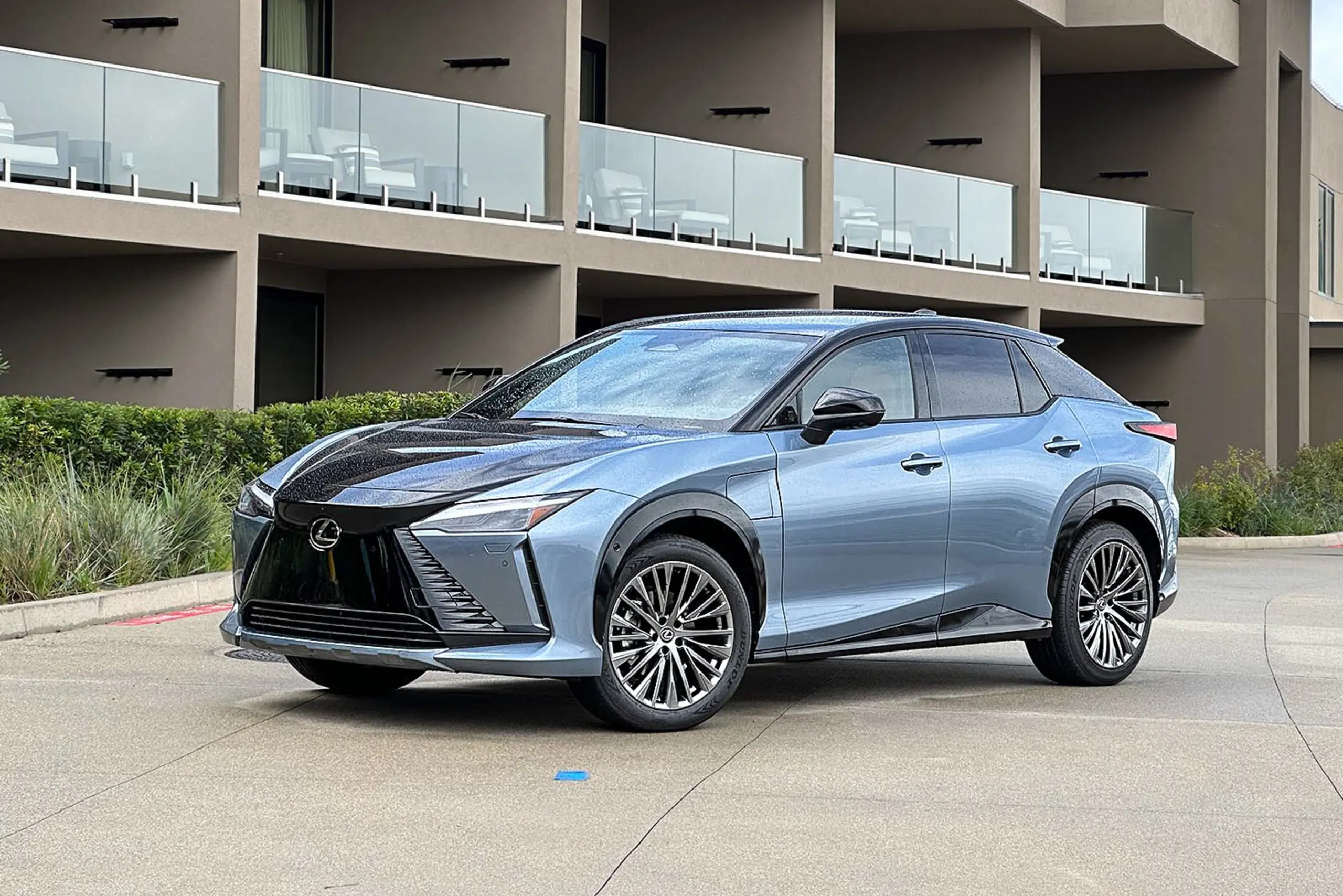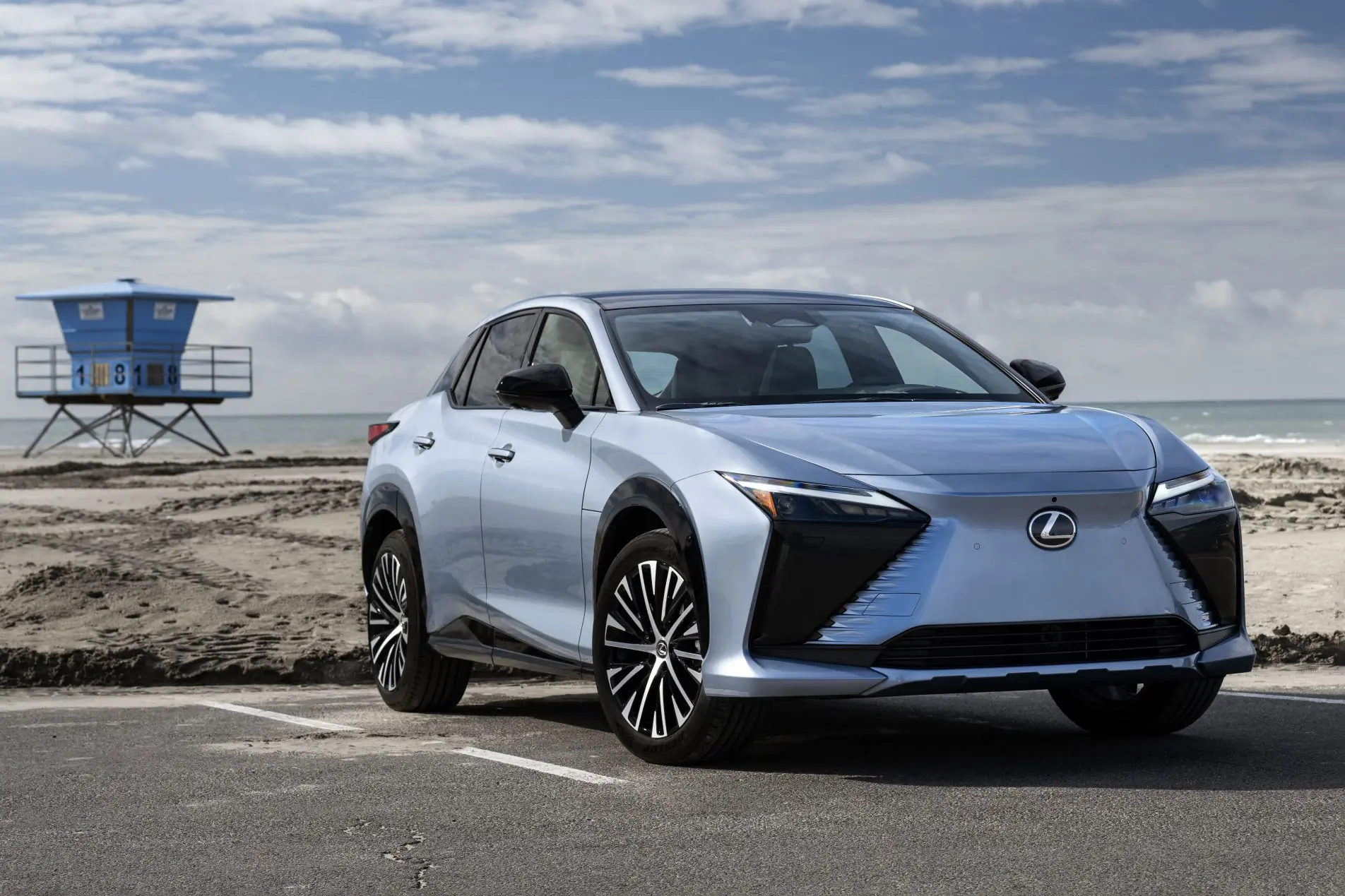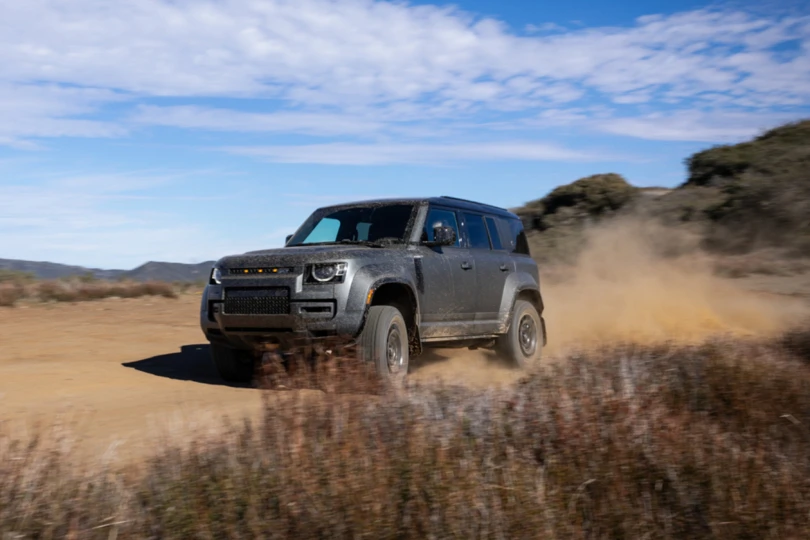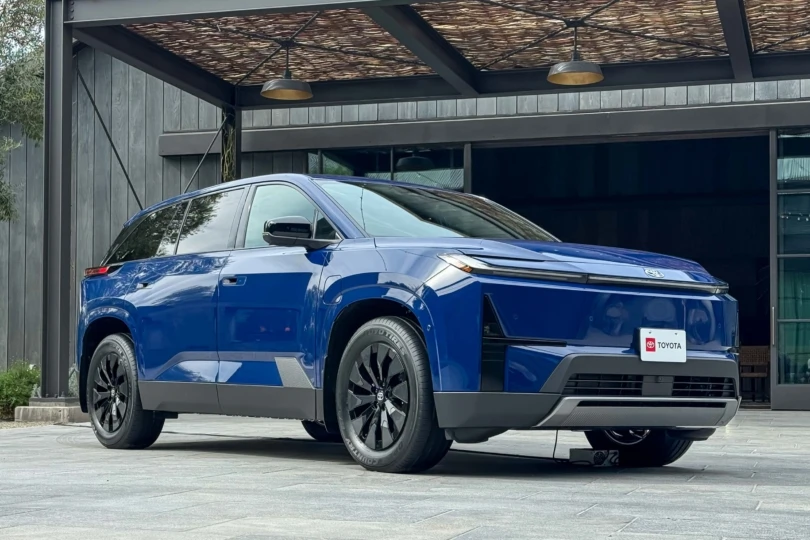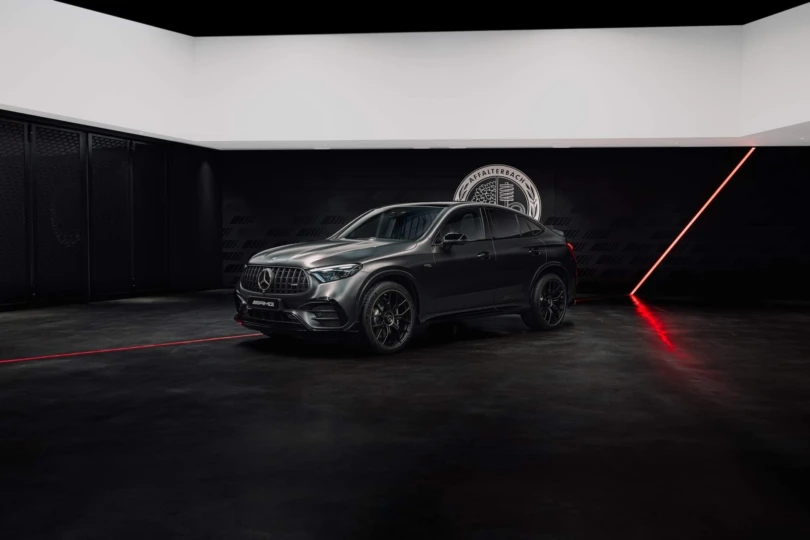There’s a lot to like about the RZ 450e, especially if you’re already a Lexus fan. It offers an array of high-tech features and will add a sporty new steer-by-wire system option in the next year or two. But there are some downsides, most notably the electric crossover’s meager range, which runs from 196 to 220 miles depending upon the package you opt for.
With plans to fully “electrify” its line-up by 2030, Lexus has a gaping hole where it needs a battery-electric vehicle. The 2023 RZ 450e fills that gap and, for the most part, offers the sort of design and features that traditional Lexus buyers should appreciate. And it’s drawing attention from tech fans with plans to add an optional steer-by-wire system.
The RZ is based on the same platform as the Toyota bZ4X, but the Lexus crossover gets more features and improved power. Where it falls short, however, is on the range front. At a maximum of 220 miles, it delivers the lowest range in a class that includes serious EV competitors such as the Audi Q4 e-tron, the Volvo XC40 Recharge, and the Cadillac Lyriq. And that’s likely to cost Lexus plenty of potential buyers.
In short: Lexus is finally getting into the EV game after focusing on hybrids and PHEVs. The 2023 Lexus RZ 450e is quiet, roomy, and loaded with the sort of features you’d expect from the Japanese luxury brand. And it plans to add a breakthrough steer-by-wire system as well. But its limited range is likely to be a shortfall many potential buyers simply won’t accept.
- Engine: Twin Permanent-Magnet Synchronous electric motors. Front: 150 kW,Rrear 80 kw
- HP/Torque: 308/196
- MPG: 105/89/97 City/Highway/Combined
- Range: 220 miles with 18-inch wheels and tires; 196 with 20-inch wheels and tires.
- Cargo: max 55.6 cu. ft.
- Towing: Not tow rated
Pros
- Plenty of desirable technology, including Lexus voice assistant
- Reasonably peppy
- More powerful than Toyota bZ4X
- Good interior and cargo space
- Standard AWD
Cons
- No frunk
- Shortest range in its segment
- Charging time is average, at best
- Noisier than typical Lexus
- Can't tow a trailer
RZ 450e: A Critical Addition
“This is a pivotal year for us,” Greg Kitzens, General Manager of Lexus Marketing, said earlier this month as I joined in with a small group of automotive journalists invited to San Diego for a test drive of the new RZ 450e.
While there are plenty of reasons why 2023 will be a significant year for the Japanese luxury brand, perhaps nothing matters more than the launch of the all-electric crossover.
Taking a cue from its mainstream sibling, Toyota, Lexus was early to market with conventional hybrids and even offers several different plug-in packages on the latest-generation RX crossover. But the 2023 Lexus RZ 450e marks its belated entry into the emerging market for pure EVs.
Anemic Range
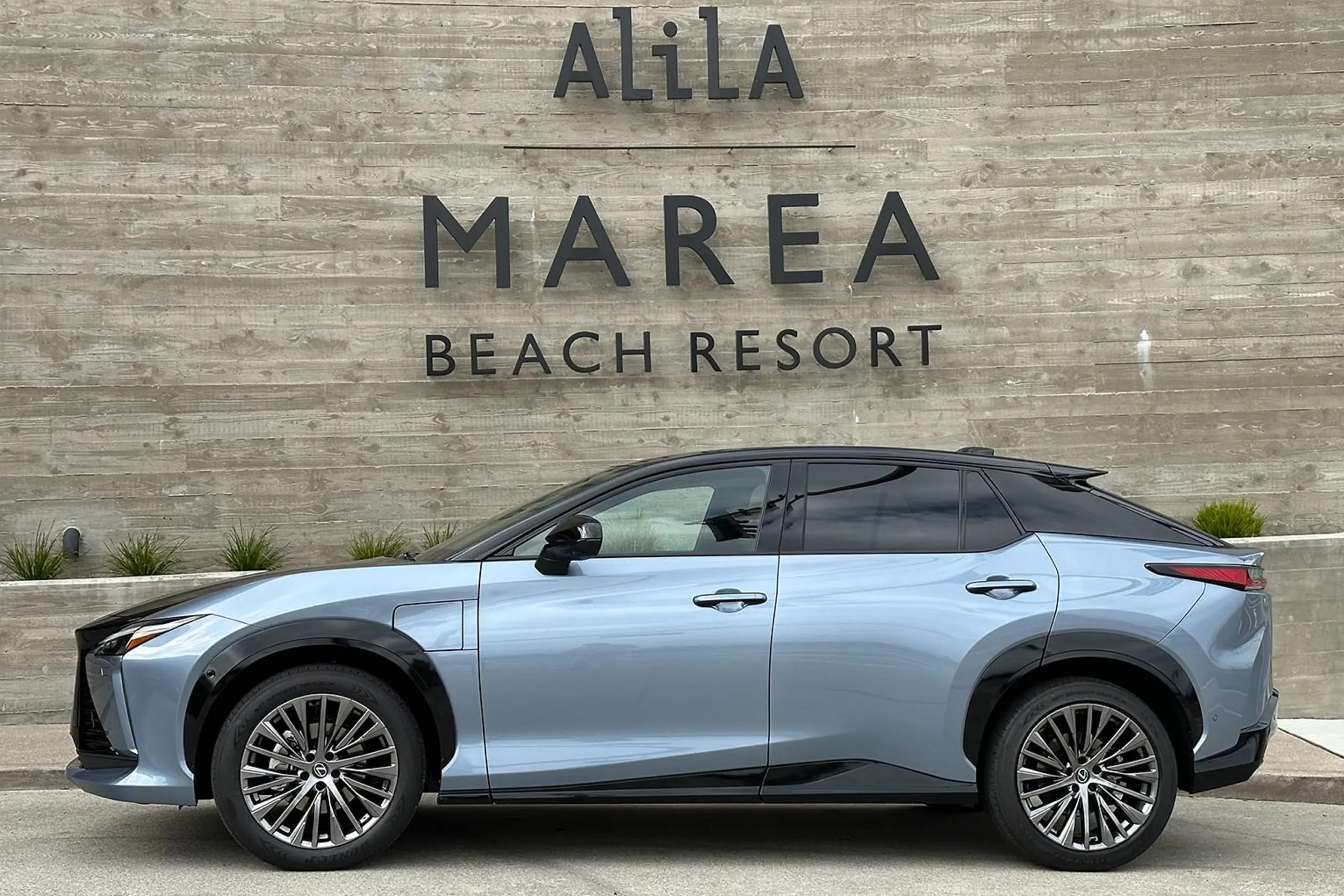
Unlike some competitors, Lexus didn’t stray far from its familiar design language, primarily enhancing range-extending aerodynamics. The RZ hews even closer to home when it comes to the requisite luxury features and technology. Perhaps the biggest surprise comes with the planned introduction of a steer-by-wire system sometime after the initial launch of the RZ.
All that should appeal to traditional Lexus buyers thinking of going electric and the younger, more tech-savvy motorists Lexus wants to win over. Or it would if Lexus hadn’t fallen short in one critical area: range.
The base model, equipped with 18-inch wheels, delivers a truly mediocre 220 miles per charge, while upgraded versions, shod with 20-inch wheels, get an absolutely anemic 196 miles.
That helps explain why the brand’s sales aspirations are truly minimal. Kitzens forecasts demand will reach just 4,900 during the first year, pretty much a rounding error on Tesla’s books.
Lexus RZ 450e: Familiar Design Language
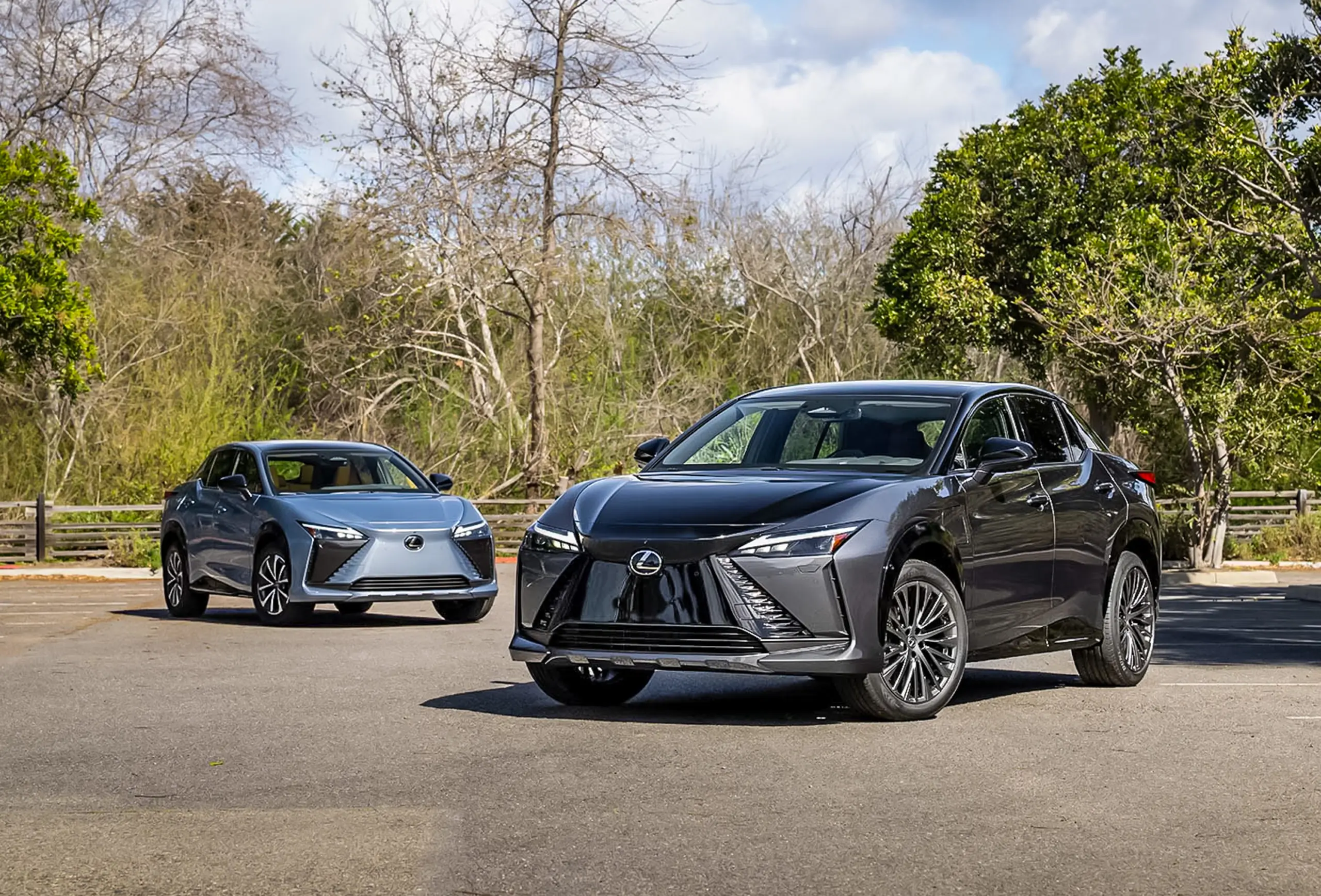
The 2023 Lexus RZ 450e shares the same e-TNGA “architecture” as the Toyota bZ4X introduced last year. But it gets a number of requisite upgrades. Among other things, the platform and body have been stiffened to yield a more compliant and comfortable ride.
And where the bZ is nearly identical in design to the Subaru Solterra that also shares its underpinnings, the Lexus EV gets a more distinctive look. That starts with a modified version of the trademark Lexus “spindle grille.”
When it comes to EVs, aerodynamics are critical to enhancing both performance and range. So, the grille here is sealed shut since there’s no engine under the hood to cool. Small, low-mounted intakes provide what airflow is necessary to cool the crossover’s twin electric motors and battery pack.
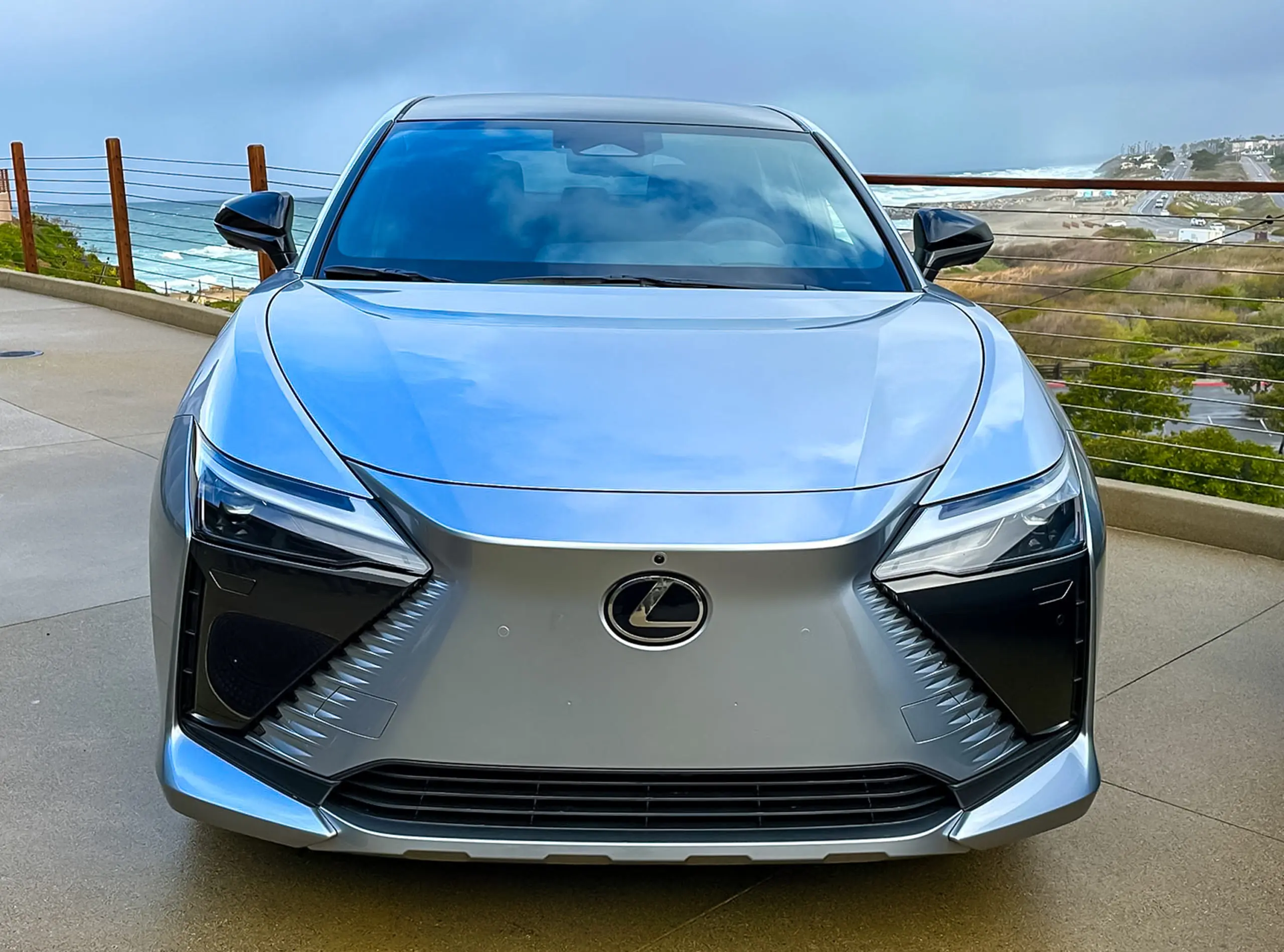



The RZ 450e doesn’t entirely hew to current EV design fads. Rather than a cross-grille lightbar, it opts for a backlit Lexus logo up front. And, instead of a wing flowing off the back of the roof, it uses twin “vortex generators.” It also gets a fully enclosed underbody.
No “Frunk” and No Glovebox
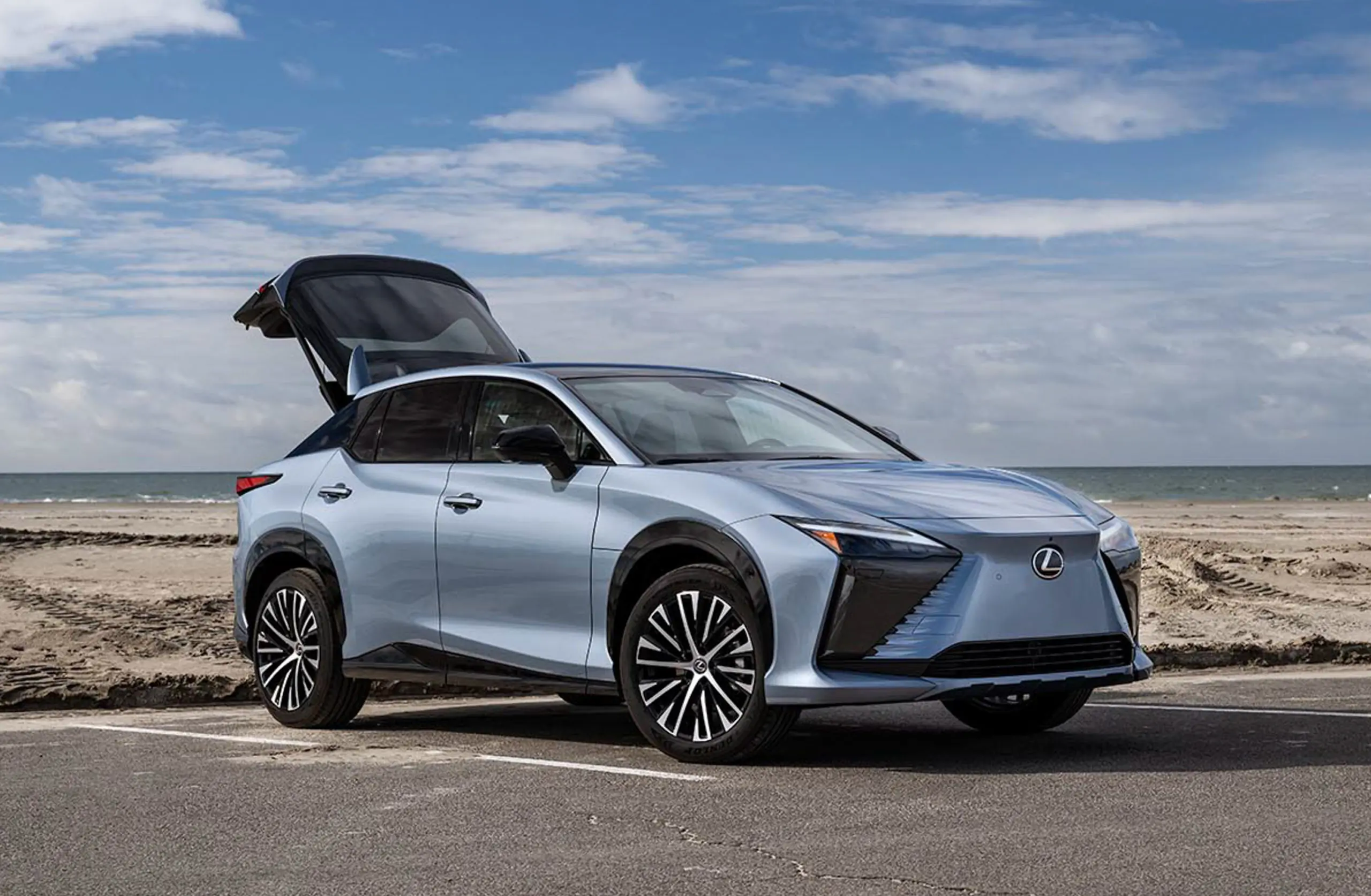



Unfortunately, one way Lexus charted a different path is its decision not to offer a front trunk where an internal combustion engine normally would live. Not all competitors do, but it’s a real plus for those, like Tesla, who have a “frunk.”
Bold wheel wells give the EV a sense of power. And the huge panorama roof adds to the luxury feel. Offered standard on the RZ 450e Luxury package — and as an option on the Premier model — the glass roof is also one of several standout technical features.
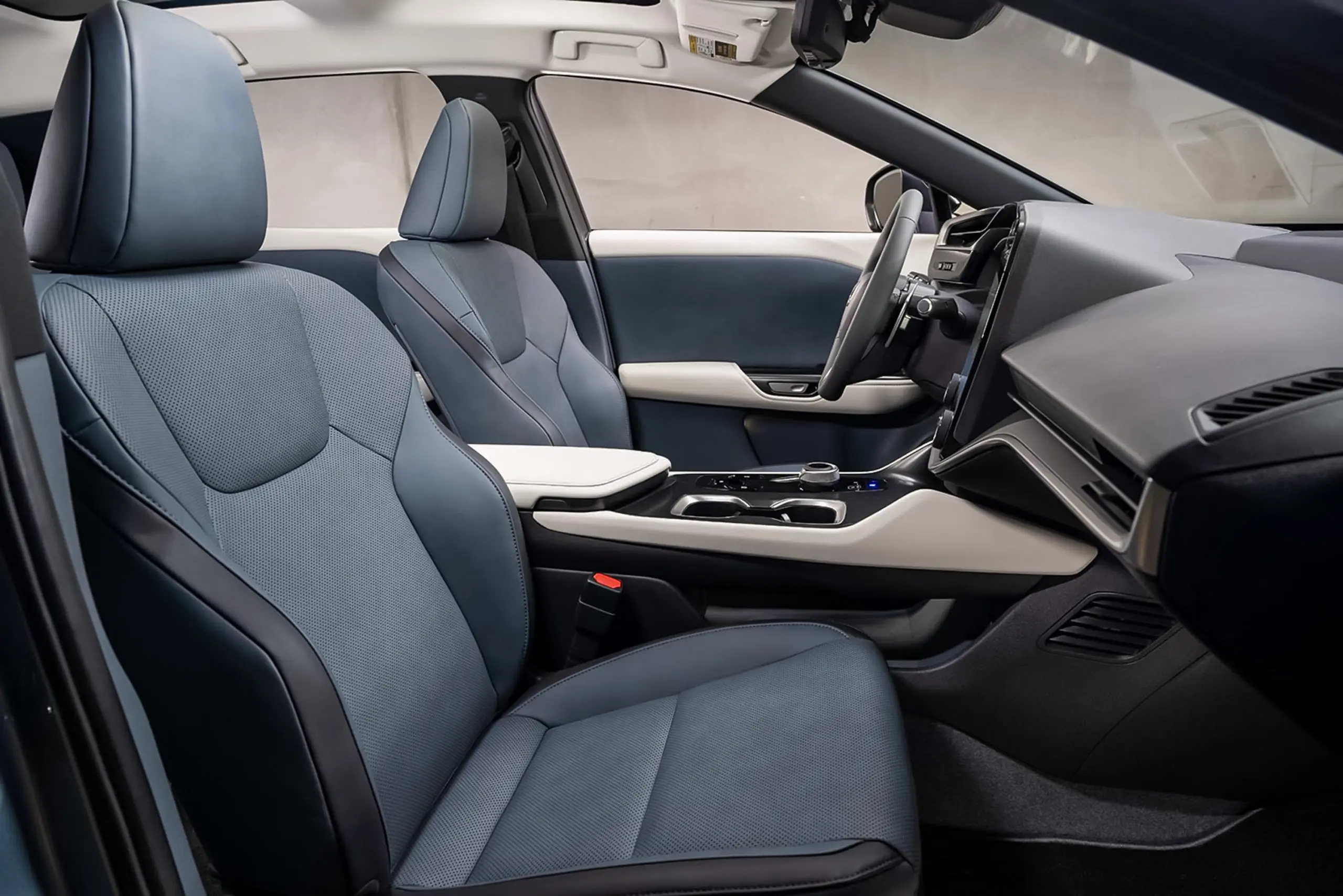



Slip inside, and you might wonder what happened to the sunshade normally used to seal the sunroof off on an overly sunny day. Instead, you touch a button in the RZ that instantly turns the glass from transparent to opaque.
The interior is surprisingly roomy. Though RZ is only slightly bigger than the compact Lexus NX crossover, its cabin is more in line with the midsize RX — and it offers an extra two inches of headroom compared to both of those gas-powered models.
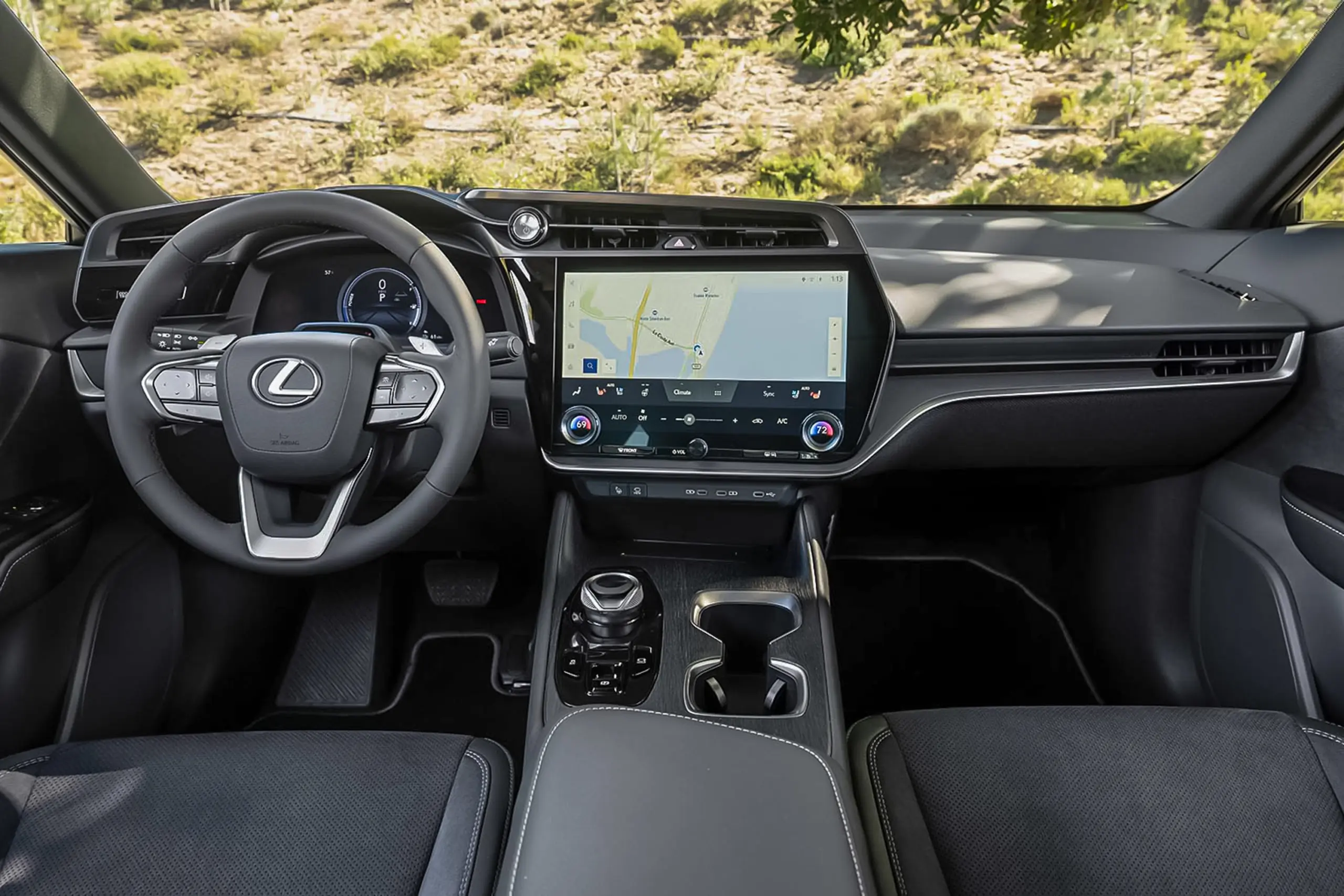



One of the odder decisions was to eliminate a glovebox, Lexus designers going, instead, with an oversized center console with plenty of storage space.
Overall, the EV’s cabin is clearly in line with the upscale position of the Lexus brand. But the automaker shied away from traditional, luxury materials, replacing most of the leather, wood, and metal with synthetics such as Ultrasuede, made from recycled materials.
RZ 450e Crossover: A High-Tech Showcase




There’s plenty of technology in the cabin, with USB ports pretty much anywhere you look. And while there are a handful of traditional controls, most functions are operated by the infotainment system — all RZ models feature an LED gauge cluster and 14-inch infotainment screen.
The Lexus Voice Assistant is the automaker’s answer to Amazon’s Alexa and can handle a broad range of vehicle functions using plain English commands.
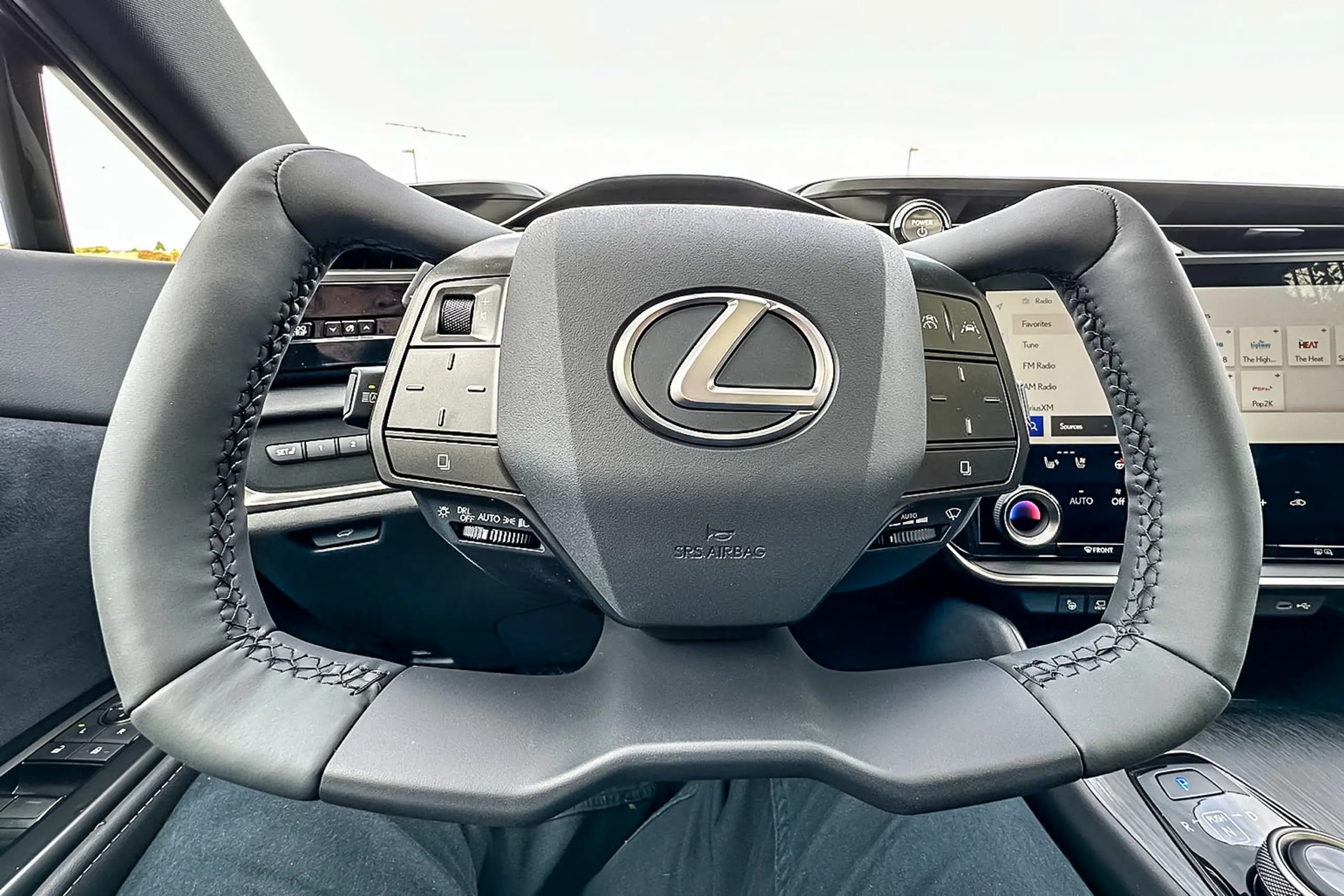



While unavailable at launch, Lexus will shortly add a steer-by-wire system, which uses a yoke rather than a traditional steering wheel. It eliminates any mechanical link with the front wheels and if anything, seems the sort of technology you’d expect to debut on one of the brand’s sportier models, the LC, perhaps, or an F Sport package.
Another trick feature is the radiant heating system mounted below the instrument panel. It uses infrared energy to come on almost immediately. In the process, Lexus claims, it uses less energy than a conventional vehicle heater which is a major reason why EVs lose so much range in colder weather.
A Severe Lack of Range
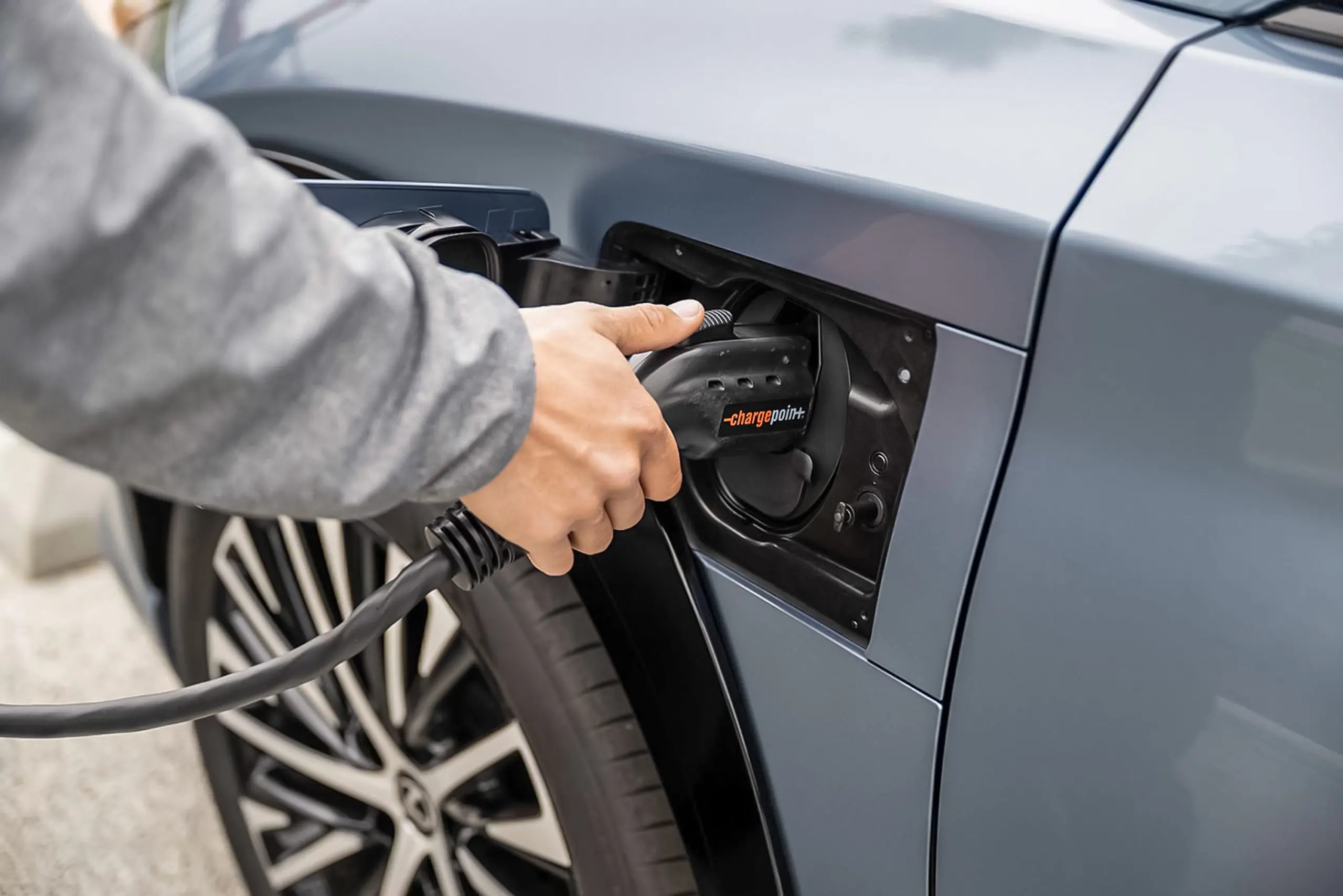



With the radiant heating system and all the work Lexus has done to improve aerodynamics, one might expect the new RZ 450e to deliver solid range numbers — far from it. At a maximum of 220 miles and as little as 196, it’s the worst model in a class that includes products such as the Audi Q4 e-tron Quattro, the Genesis GV60, the Cadillac Lyriq, and the Volvo XC40 Recharge. That group musters anywhere from 223 to as much as 307 miles between charges.
Lexus officials make a seemingly reasonable claim that the typical U.S. motorist rarely logs more than 100 miles a day, and EV buyers tend to plug into a home charger at night. Perhaps, but Americans tend to buy vehicles based on the extreme usages they anticipate making, even if rarely.
And one should consider that EVs can lose as much as 40% of their range in extreme cold. Even with the electron-saving radiant heater, the RZ falls short.
RZ 450e Powertrain
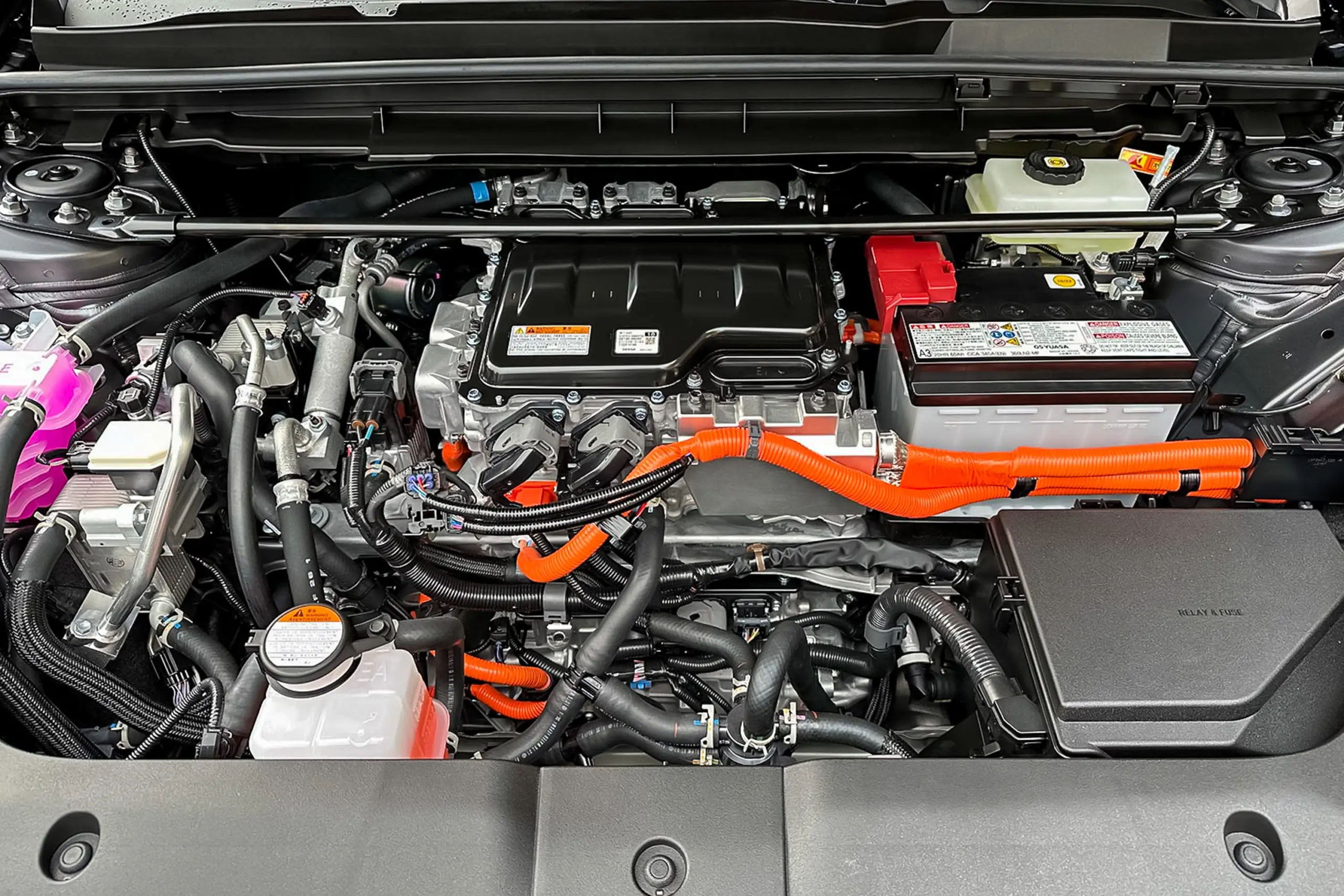



One reason why the range is so small is its modestly sized 71.4kWh battery pack. It has to power two separate motors, one on each axle, delivering a combined 308 horsepower and 196 pound-feet of torque. By comparison, the single-motor version of the Toyota bZ4X manages a meager 196 hp, the twin-motor version bumping it to a still-modest 210.
While far from a segment benchmark, the RZ is reasonably quick, with a 0-60 mph time estimated at 5 seconds.
The Lexus EV is available solely in a two-motor configuration and uses a different all-wheel-drive system than the bZ4X. The Direct4 package is quite effective at shifting torque around, as needed, to give the RZ a sportier feel than its more plebian cousin.
Curiously, the Lexus comes with a smaller, 6.6 kWh onboard charger than competing EVs. The Lyriq can deliver as much as 19.2 kWh, and the Audi 9.6. As a result, it will take as much as 13 hours to recharge the battery using a 240V source. And it lags behind some competitors when plugged into a DC fast charger, as well. Expect to spend about 30 minutes to get from 10 to 80% when using a 150kW system.
RZ 450e Driving Impressions
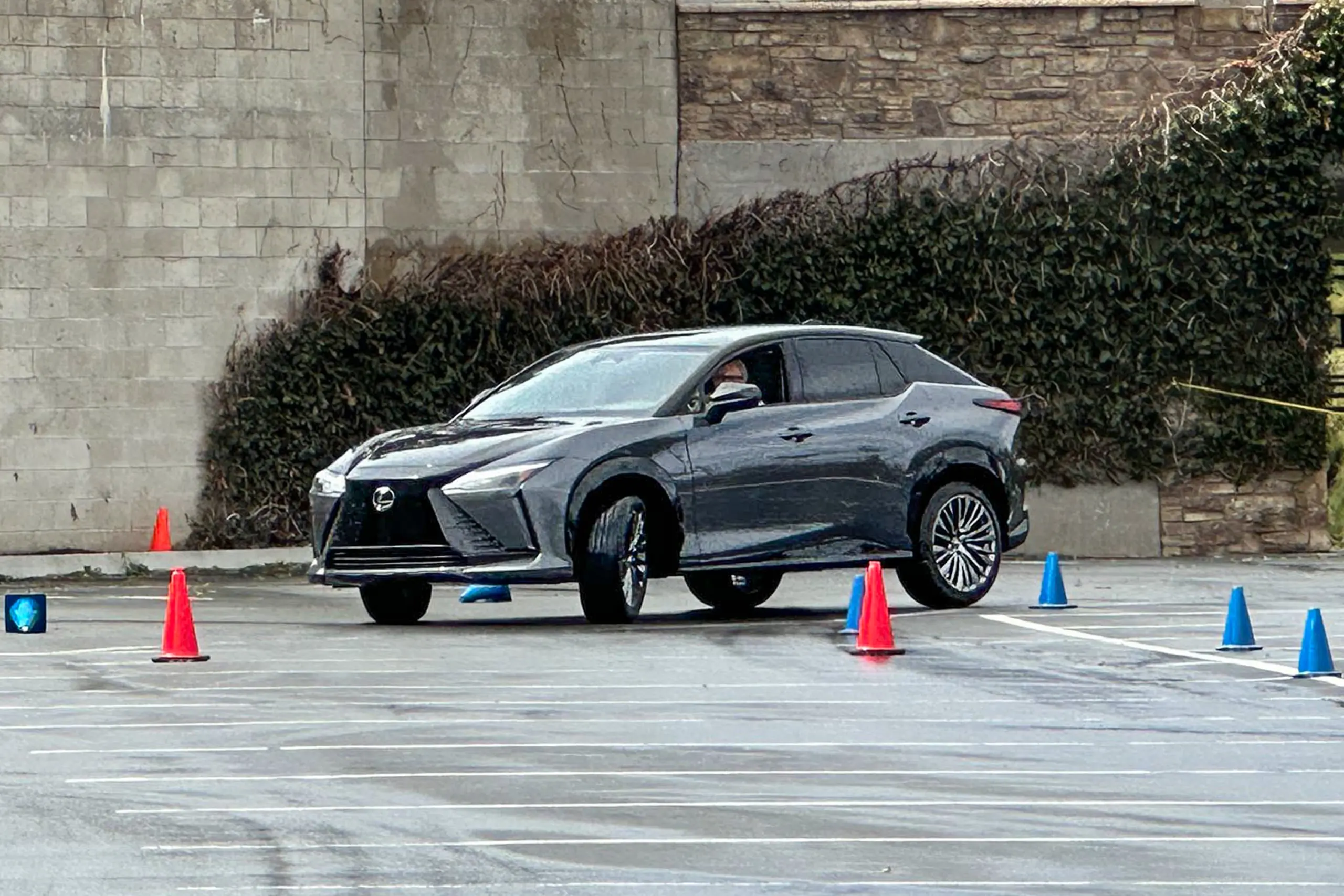



If you’re the typical Lexus driver, you’ll likely find it easy to plug into the brand’s first battery-electric vehicle. With the upgraded platform, the RZ 450e drives a lot like the NX and RX, though the instant torque of its electric motors adds a bit more of a thrill when you stomp on the throttle.
The crossover handled reasonably well, considering the relatively limited driving conditions I was able to put it through during my trip to San Diego. It’s not quite as snappy as some competitors, but it maneuvers through corners handily, with relatively little body roll and a good sense of road feel. It’s no sports car, but the sort of tourer you’d want to take on long trips … if it just had enough range.
A personal complaint is the lack of a 1-Pedal mode. All EVs use brake regeneration to recapture energy normally lost during braking and coasting. In vehicles such as the Genesis GV60 and Cadillac Lyriq, you can adjust the amount of regen. In more aggressive modes, you’ll slow down quicker simply by modulating the throttle. But 1-Pedal settings not only slow fast but let you come to a complete stop simply by lifting completely off the accelerator. The RZ will continue creeping forward like a conventional gas model.
Steer-by-Wire
While most of the test models Lexus provided for the drive had conventional steering, it also brought out three early prototypes with the steer-by-wire system. The technology, as I noted, eliminates mechanical links between the front wheels and the steering wheel. To signal the difference, Lexus has adopted an aircraft-style yoke. At its maximum, you turn it 170 degrees in either direction to reach steering lock.
The computer controlling the system reads not only the driver’s input but other factors, such as vehicle speed, and adapts accordingly. So, at first, it can feel decidedly non-linear, which is why Lexus required me to spend a half-hour trying out the system on a closed course. But, with each loop I took, my confidence grew, and I eventually was able to take a prototype out on public roads for another 20 minutes.
I’m not convinced the steer-by-wire system is ready for production. And neither is Lexus, which is why it won’t be available at launch. The automaker isn’t saying when it will reach showrooms, but that could take another year or two. The question is whether it’s the sort of feature RZ buyers will appreciate and pay for. No price tag was offered, but I don’t expect it to be cheap.
2023 Lexus RZ 450e: Pricing and Availability
The base 2023 Lexus RZ 450e Premier edition starts at $59,650 once you factor in destination fees. The version I spent most of my time in moved the needle to $67,300, including that $1,150 destination charge. The luxury package takes you to a starting price of $67,590 before options. It offers some welcome upgrades, including a panoramic roof and an audiophile Mark Levinson sound system.
From a price standpoint, RZ falls roughly in the middle of its segment.
Production of the 2023 Lexus RZ 450e started on January 23 at the automaker’s Motomachi plant in Japan. The first of the EVs should start rolling into U.S. showrooms about now. As an import, it won’t qualify for the recently revised federal EV tax credits.
2023 Lexus RZ 450e: Review Wrap-Up
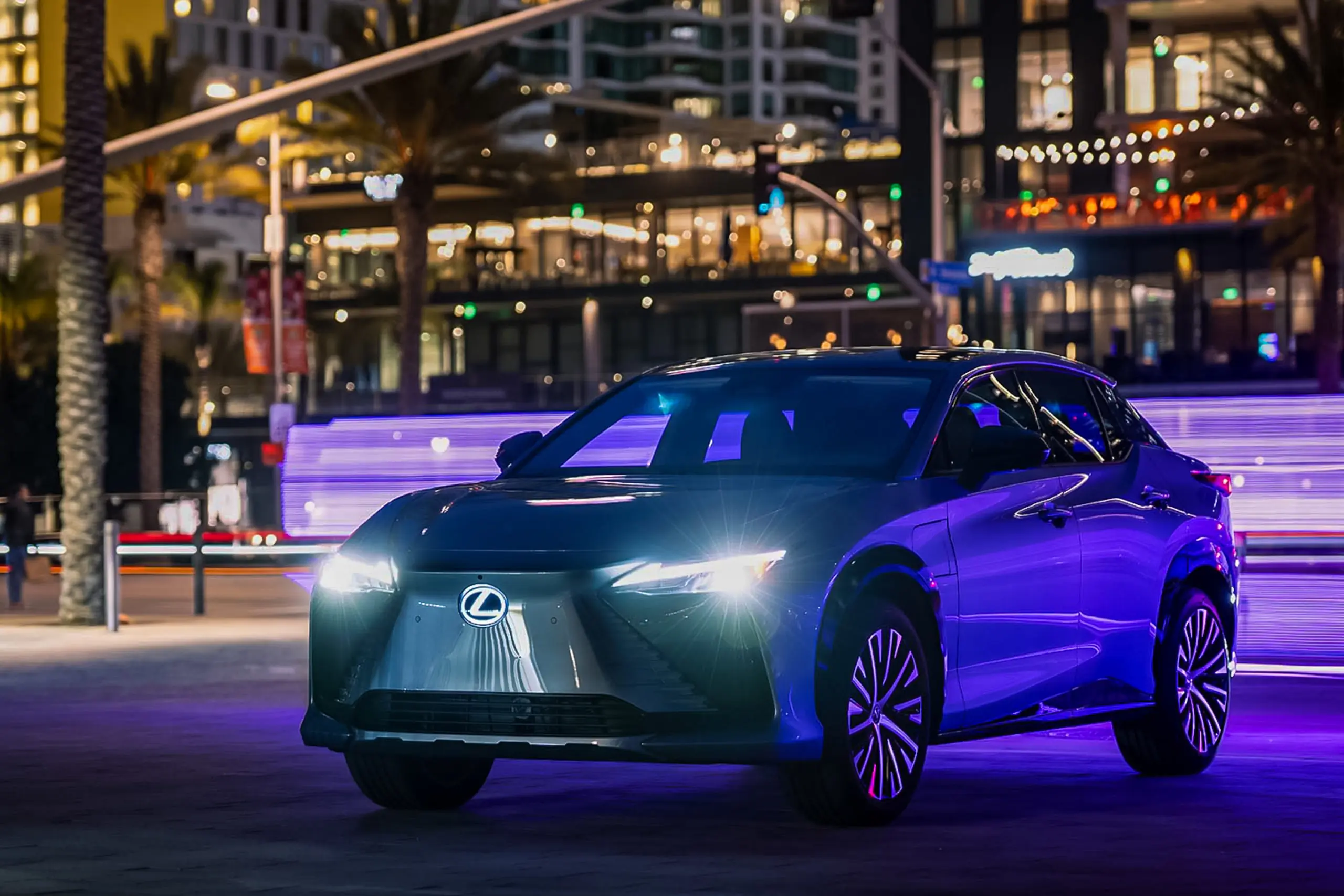



There are several things to like about the 2023 Lexus RZ 450e, and it should feel particularly familiar and appealing to the brand’s existing buyers. It’s stylish enough without the design excesses of some key competitors. It’s easy to get into and drive, even if you’ve never been behind the wheel of an EV before.
But those range numbers are simply going to take it off the consideration list for many potential buyers, which may explain why Lexus has such low sales aspirations for its first-ever EV. The RZ will likely find a niche as a second or third vehicle for existing Lexus buyers and as a commuter car for others. That’s too bad. With another 15 to 20% more range, it could have stood out as a more viable offering, something we’d have hoped for from the first-ever Lexus battery-electric vehicle.
